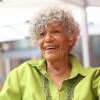In her new book, New York Times journalist Maggie Haberman offers a meticulously detailed account of the life and career of former president Donald Trump, which — yes — includes reporting on his days as a child terror.
“He did not have a great reputation in the neighborhood as a kid,” Haberman said on GBH’s Boston Public Radio.
One of several accounts from Trump’s early childhood included the story of a mother who found the would-be president pelting rocks at her son’s crib in her Queens backyard.
“She starts hearing the baby screaming, and she comes outside and a roughly five year-old Donald Trump is throwing rocks at the crib,” she said. “I guess you can allow that, maybe, initially he didn’t realize that there was a baby there, I don’t know.”
Haberman’s new book is “Confidence Man: The Making of Donald Trump and the Breaking of America,” which was released on Oct. 4 and leapt to the top of the New York Times’ nonfiction bestseller list. It includes interviews Trump gave specifically for the book, despite derisions of Haberman as “not legit” and “a third-rate reporter.”
“He frankly can’t quit the mainstream media, as much time as he spends complaining about all of us,” Haberman said, adding that Trump is “uniquely focused on the [New York] Times.”
“He interacts with media and processes media unlike anyone else I have ever covered, probably unlike anyone else any of us have ever covered,” she went on. “He so badly wants attention, and so badly wants news coverage, and it’s just a narcotic. It’s the attention he craves on some cellular level.”
The Pulitzer Prize–winning reporter also spoke with hosts Jim Braude and Margery Eagan about the moment she first realized Trump had a serious shot at the White House, at a rally in Dubuque, Iowa in 2016.
“I was going up to people asking a pretty leading question, which was basically ‘Are you here because the spectacle is going to end?’ And one after another, people told me they were going to caucus for him. One guy looked at me like I had eight heads. ... When I asked him ‘Why are you gonna caucus for him?’ he said, ‘I watched him run his business.’”
“He meant ‘The Apprentice,’” she noted. “That was something of a lightning-bolt moment for me, of really the degree to which this divide [between how New Yorkers viewed Trump] versus elsewhere — it was so pronounced.”
Beyond the borders of New York City, where he was often mocked by peers, Haberman said those who knew Trump through newspaper coverage and "The Apprentice" had a starkly different perception of the real estate developer-turned-TV host.
“People who either tracked him in the 1980s when he made himself as a brand synonymous with wealth, or who watched 'The Apprentice,' they viewed him as this hyper success,” she said. “That was obviously not true, but that really solidified the view of him outside.”
That perception, Haberman said, is what allowed Trump to morph into the political force he would become in 2016. What those supporters wouldn’t see, however, is a Trump she described as “confusing” and “lonely.”
"[Trump] believes in dominance and intimidation, and yet he is: there is this side of him that is a people pleaser, and that is afraid of one-on-one interpersonal conflict. And that is lonely,” she said. “It is just a fundamentally strange and often disorienting thing for people around him to experience.”








